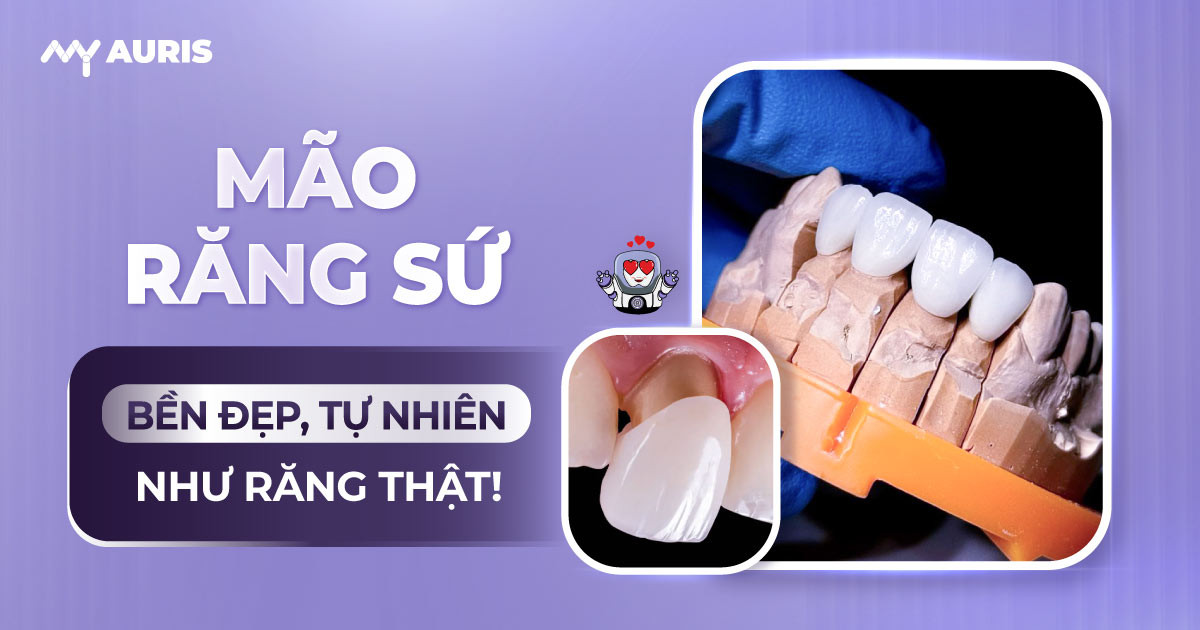Do you want to have bright, white, beautiful teeth and a radiant smile? Porcelain crowns are an effective and aesthetic tooth restoration solution, chosen by many people today. Porcelain crowns help restore chewing function, improve aesthetics and protect real teeth from damage. Do you want to learn more about porcelain crowns? Let’s explore with My Auris Dental Clinic all the necessary information about this type of tooth restoration.
Learn about porcelain crowns: Effective and aesthetic tooth restoration
Ceramic crown is an effective and aesthetic tooth restoration solution, widely used in dentistry today. Porcelain crowns help restore chewing function, improve aesthetics and protect real teeth from damage.
What is a porcelain crown?
A porcelain crown is a ceramic shell that covers the entire surface. tooth surface, used to restore damaged, broken, chipped, decayed or discolored teeth. Porcelain crowns are made from many different materials, each with its own advantages and disadvantages. Porcelain crowns are fixed to real teeth with specialized dental glue, creating a solid and durable structure.
Advantages and disadvantages of porcelain crowns
Advantages and disadvantages of porcelain crowns
Advantages and disadvantages of porcelain crowns point:
- Aesthetics: Porcelain crowns are made from porcelain with natural colors, similar to real teeth, helping to improve the aesthetics of teeth.
- Durability: Porcelain crowns are highly durable and can be used for a long time.
- Safety: Porcelain crowns do not contain metal, do not cause allergies, and are safe for health.
- Function: Porcelain crowns help restore chewing function, helping you chew comfortably and effectively.
- Protects real teeth: Porcelain crowns help protect real teeth from direct contact with food, avoiding damage.
Disadvantages:
- Cost: The cost of making porcelain crowns is higher than other tooth restoration methods.
- Performance time: The process of making porcelain crowns usually takes longer than other restoration methods.
- Possibility of peeling: Porcelain crowns can peel off if notnot properly cared for.
- Refining real teeth: To attach a porcelain crown, the dentist needs to grind a small part of the real tooth, which can cause damage to the real tooth.
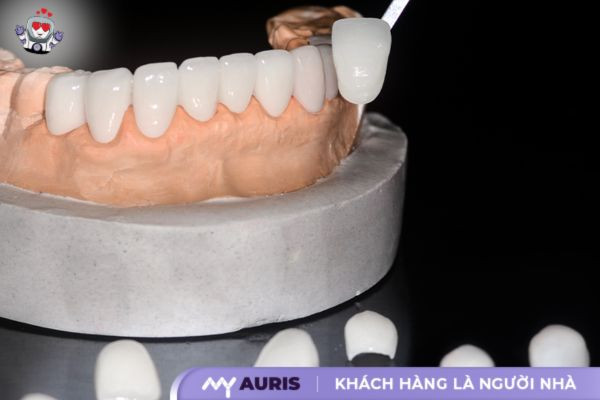
Process Making porcelain crowns: From preparation to completion
The process of making porcelain crowns is a series of professional steps, requiring high technique from the dentist and close coordination between the dentist and the crown manufacturing lab. This process is carried out scientifically, ensuring to give the patient a beautiful, sturdy and long-lasting porcelain crown.
Examination and consultation
The first step in the crown making process Porcelain teeth are examined and consulted. The doctor will conduct a general examination of your oral health and determine the cause of the need to restore your teeth with porcelain crowns. Your doctor will advise you on the types of porcelain crowns suitable for your dental condition and needs.
- Oral health check: The doctor will thoroughly examine your teeth, including: checking the condition of real teeth, assessing the level of damage, gum condition, and overall oral health.
- Choose the type of porcelain crown: Your doctor will advise you on suitable types of porcelain crowns, including: zirconia porcelain crowns, porcelain-metal porcelain crowns, metal-free porcelain crowns, bonded porcelain crowns.
- Discuss costs: The doctor will provide detailed information about the cost of making porcelain crowns, including examination costs, tooth grinding costs (if necessary), crown fabrication costs, crown installation costs, warranty costs (if any).
- Answering questions: The doctor will answer all your questions about the process of making porcelain crowns, implementation time, care after making crowns, diet,…
Preparation teeth
After examination and consultation, the next step is to prepare the teeth for crown placement. This step requires the dentist’s care and meticulousness to ensure the teeth are treated safely and effectively.
- Tooth grinding (if necessary): To create a snug fit for the porcelain crown, the dentist will grind a small portion of the real tooth. The doctor will use itUse specialized grinding tools and appropriate techniques to ensure the tooth pulp is not affected.
- Teeth cleaning: The doctor will clean the teeth using an antiseptic solution to remove bacteria and plaque, creating favorable conditions for crown placement.
- Taking tooth impressions: The doctor will use specialized impression materials to take tooth impressions. The tooth impression will be sent to the lab to make the porcelain crown.

Taking tooth impressions
Taking tooth impressions is an important step in the process of making porcelain crowns. Tooth impressions will be used to create a mold for the porcelain crown, ensuring a tight fit and aesthetics for the porcelain crown.
- Choose impression material: The doctor will choose the appropriate impression material for each case. Common types of impression materials include: alginate, silicon, polyvinyl siloxane.
- Proceed to take an impression: The doctor will put the impression material into your mouth and press gently to take an impression of the teeth. You will have to stay in position for about 3-5 minutes for the material to harden.
- Checking tooth impressions: After taking tooth impressions, the doctor will check the accuracy of the tooth impressions to ensure there are no errors.
Making porcelain crowns
After taking tooth impressions, the tooth impressions will be sent to the lab to make porcelain crowns. The lab will use modern machinery and techniques to create a porcelain crown that fits tightly, beautifully and firmly.
- Choose manufacturing materials: The lab will choose materials to make porcelain crowns that match the type of porcelain crown you have chosen. Common types of fabrication materials include: zirconia ceramic, ceramic metal, metal-free ceramic.
- Making porcelain crowns: The lab will use modern machinery and techniques to create a porcelain crown that fits tightly, beautifully and firmly. The manufacturing process includes steps: mold making, porcelain casting, polishing, glazing.
- Checking the porcelain crown: After fabrication is complete, the lab will check the fit, color, and shape of the porcelain crown before sending it to the dentist.
Attach the crown porcelain
The final step in the porcelain crown making process is attaching the porcelain crown. The doctor will attach the porcelain crown to the position of the real tooth, creating a solid and durable structure.
- Check fit fit: The doctor will check the fit of the porcelain crown to the real tooth. If the porcelain crown is too wide or too narrow, the doctor will adjust it.
- Use specialized glue: The doctor will use specialized glue. Used to attach porcelain crowns to real teeth. The adhesive will be exposed to UV light to harden, forming a durable bond.
- Check the fit: After attaching the crown, the doctor will check the fit of the porcelain crown and check the condition of the surrounding gums. around.
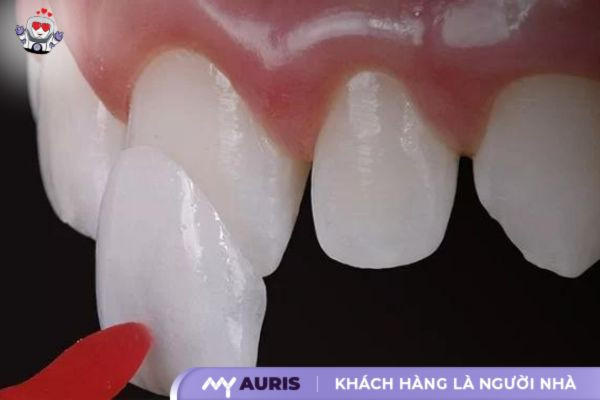
Types of ceramic crowns: The right choice for your needs
Ceramic dental crowns are an effective and aesthetic tooth restoration solution, helping to restore chewing function, improve aesthetics and protect real teeth from damage. On the market today, there are many different types of porcelain crowns, each with its own advantages and disadvantages, suitable for each specific case. This article will introduce the 4 most popular types of porcelain crowns, helping you have an overview and choose the type of crown. suitable for your needs.
Zirconium porcelain crown
Zirconium porcelain crown is a type of porcelain crown made from highly durable zirconia ceramic material, Natural color and good bearing capacity.
Advantages:
- High durability: Zirconia ceramic crowns are highly durable, can withstand strong chewing forces, and are less prone to grinding. wear-resistant, less likely to break, can be used for a long time.
- Natural color: Zirconia porcelain crowns have a natural color, similar to real teeth, helping to improve the aesthetics of teeth.
- Hypoallergenic: Zirconia ceramic crowns do not contain metals, do not cause allergies, and are safe for health.
- Stain resistant: Zirconia ceramic crowns are capable of Good color resistance, helps maintain natural color over time.
Disadvantages:
- High price: Zirconia porcelain crowns have a higher price than other types of porcelain crowns.
Porcelain-metal porcelain crowns
Porcelain-ceramic dental crowns are made from metal alloy and an outer ceramic layer. This type of crown has a reasonable price and relatively good durability.
Advantages:
- Reasonable price: Porcelain metal crowns have a lower price than zirconia porcelain crowns.
- Average durability: Porcelain metal crowns have average durability, can be used for quite a long time.
Disadvantages:
- Aesthetics: The inner metal layer can be exposed at the gum line, making the teeth unaesthetic.
- Allergenic: Metal layer may cause allergic reactions in some people.
- Staining: The outer ceramic layer can become discolored over time.
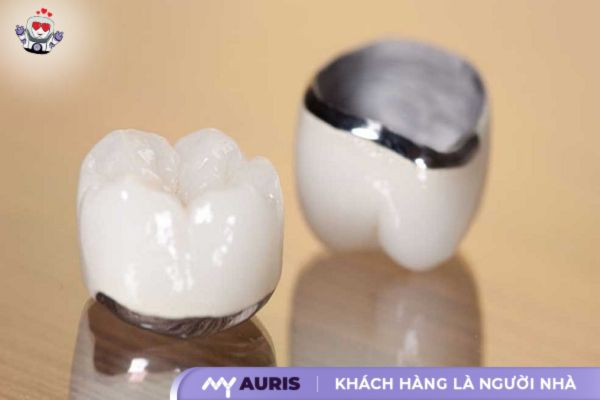
Metal-free porcelain crown
Metal-free porcelain crowns are made from monolithic porcelain, containing no metals. This type of crown is highly aesthetic, does not cause allergies, but is less durable than zirconia ceramic crowns.
Advantages:
- Aesthetics: Metal-free porcelain crowns have high aesthetics, natural color, no exposed metal edges.
- Hypoallergenic: Metal-free ceramic crowns do not contain metals, do not cause allergies, and are safe for health.
- Transparency: Metal-free ceramic crowns have high transparency, making teeth look more natural.
Disadvantages:
- Durability: Metal-free ceramic crowns have lower durability than zirconia ceramic crowns.
- Price: Metal-free porcelain crowns cost more than porcelain-metal crowns.
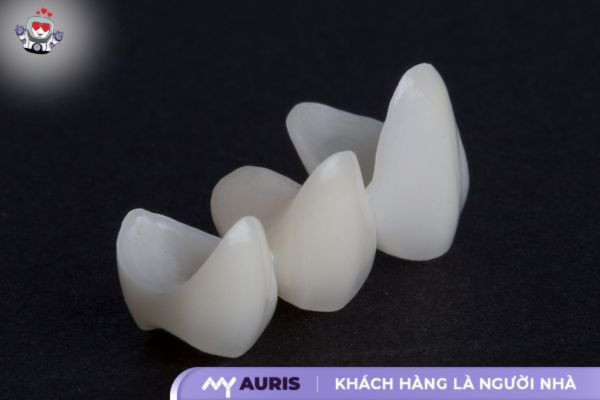
Crown Porcelain veneers
Porcelain veneers are porcelain crowns made from thin ceramic, glued directly to the surface of real teeth, which helps preserve the real teeth to the maximum and has a quick installation time.
Advantages:
- No need to grind teeth: Porcelain crowns do not need to grind real teeth, helping to preserve the real teeth to the maximum.
- Fast implementation time: The time to make porcelain crowns is faster than other types of porcelain crowns.
- Aesthetics: Porcelain crowns have high aesthetics, natural color, and help improve the aesthetics of teeth.
Disadvantages:
- Durability: Bonded porcelain crowns have lower durability than other types of porcelain crowns.
- Price: Bonded porcelain crowns have a higher price than other types of porcelain crowns.
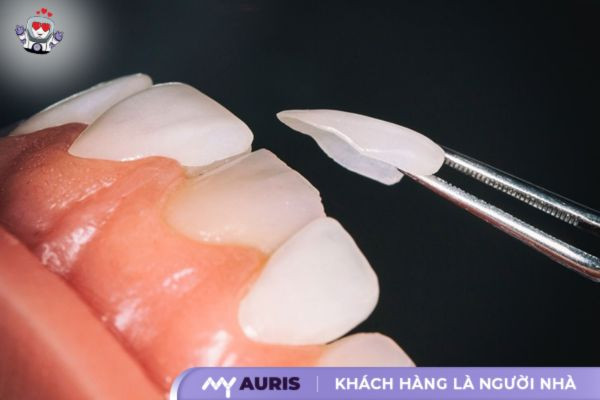
Cost of making porcelain crowns: Influencing factors and reference price list Reference
The cost of making porcelain crowns is one of the issues that many people are concerned about when wanting to restore their teeth because this cost can affect the decision to choose the type of porcelain crown as well as the reputable dental address. This article will provide information about the factors that affect the cost of making porcelain crowns and a reference price list for each type. crown.
Factors affecting cost
The cost of making porcelain crowns depends on many factors, including:
- Type of ceramic crown: Different types of ceramic crowns have the highest price, followed by metal-free ceramic crowns, and metal-ceramic crowns.Porcelain and porcelain crowns have the lowest price.
- Material: The material used to make porcelain crowns also affects the price. High quality zirconia ceramic material, high durability, beautiful color will cost more than regular ceramic material.
- Dentist’s skills: The dentist’s skills have a direct impact on the quality of porcelain crowns and the aesthetics of teeth. Dentists with experience, high technique, and use of modern technology will have higher costs than less experienced dentists.
- Dental facilities: Reputable dental facilities, using modern equipment and applying advanced technology will have higher costs than small dental facilities.
- Dental condition: Your dental condition also affects the cost of making porcelain crowns. For example, if the tooth is severely damaged and requires a lot of tooth grinding or complicated tooth treatment steps, the cost will be higher than in the case of a slightly damaged tooth.
Price comparison table for porcelain crowns
Below is a reference price list for popular types of porcelain crowns:
| Type of porcelain crown | Material | Price (million VND) |
| Porcelain crowns zirconia | High-grade zirconia | 1.5 – 3 |
| Metal-free ceramic crown | Monolithic ceramic | 1 – 3 |
| Ceramic metal ceramic crown | Metal alloy and ceramic | 0.7 – 1 |
Caring for porcelain crowns: The secret to preserving a long-lasting radiant smile
Porcelain dental crowns are an effective tooth restoration solution, giving you a radiant smile and healthy teeth. However, to protect the porcelain crown and prolong its lifespan, you need to take proper care of your teeth.
Daily oral hygiene
Daily oral hygiene is The most important factor to maintain oral health and protect porcelain crowns.
- Brush your teeth properly: Use a soft toothbrush, fluoride toothpaste and brush your teeth thoroughly for 2 minutes, at least twice a dayhey.
- Flossing: Use dental floss to remove food plaque and bacteria from places your toothbrush can’t reach.
- Rinse your mouth with mouthwash: Use mouthwash containing fluoride to kill bacteria and clean the oral cavity.
- Clean your tongue: The tongue is where bacteria accumulate, use a tongue scraper or toothbrush to clean your tongue after brushing your teeth.
Check periodically
Regular dental check-ups will help detect dental problems early, protect real teeth and prolong the life of porcelain crowns.
- The importance of regular check-ups: Regular check-ups help your dentist monitor your oral health, early detect problems such as tooth decay, gingivitis, periodontitis, plaque, tartar,… for timely treatment and avoid complications.
- Frequency of periodic check-ups: Teeth should be checked periodically every 6 months or as directed by a dentist.
- Check content: The dentist will check your oral health in general, including: checking real teeth, checking gums, checking porcelain crowns, oral hygiene, advising on oral care,…
Avoid bad habits
Some bad habits can affect the durability of porcelain crowns, you should limit:
- Chew hard, chewy things: You should avoid chewing hard, tough things that can easily break porcelain crowns.
- Using toothpicks: Toothpicks can scratch and damage porcelain crowns. Use dental floss to clean between teeth.
- Chew food on one side: You should chew food evenly on both sides to distribute the chewing force evenly, avoiding breaking the porcelain crown.
- Use your teeth to open bottles and jar lids: Use specialized tools to open bottles and jar lids to avoid breaking the porcelain crown.
Ceramic crowns are an effective tooth restoration solution, giving you healthy teeth, shining smile. To choose the right type of porcelain crown and ensure the best treatment results, contact My Auris Dental Clinic. With a team of experienced dentists, modern equipment and professional services, we always put customers’ interests first, considering customers as family members. Let My Auris Dental accompany you on your journey to having healthy, beautiful teeth and a radiant smile.


